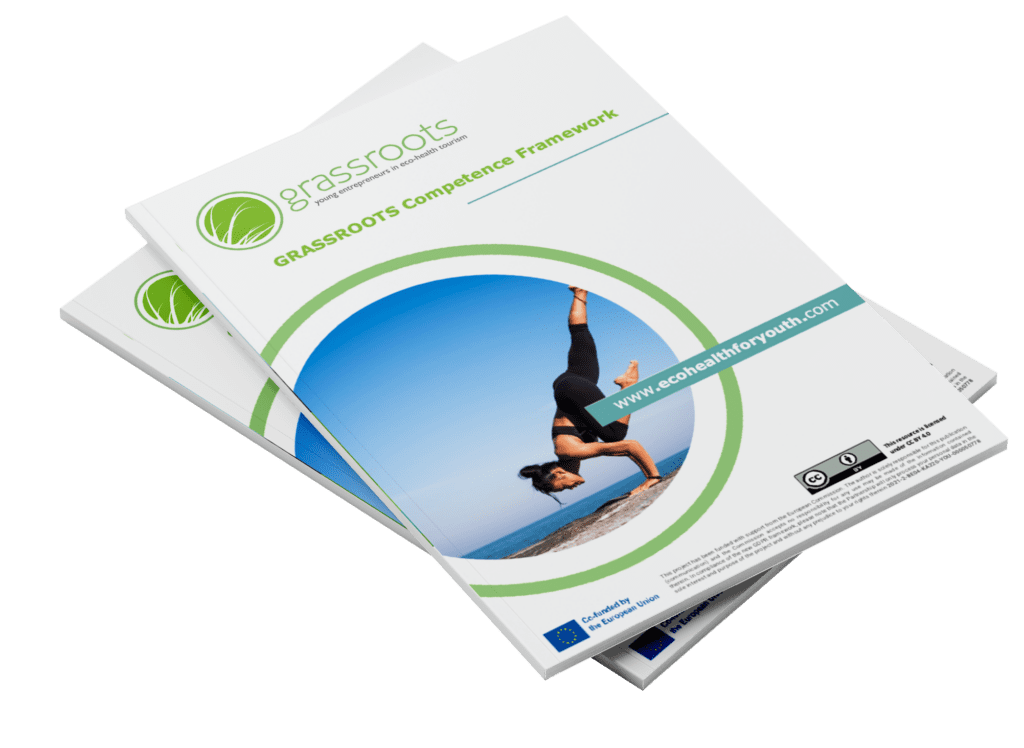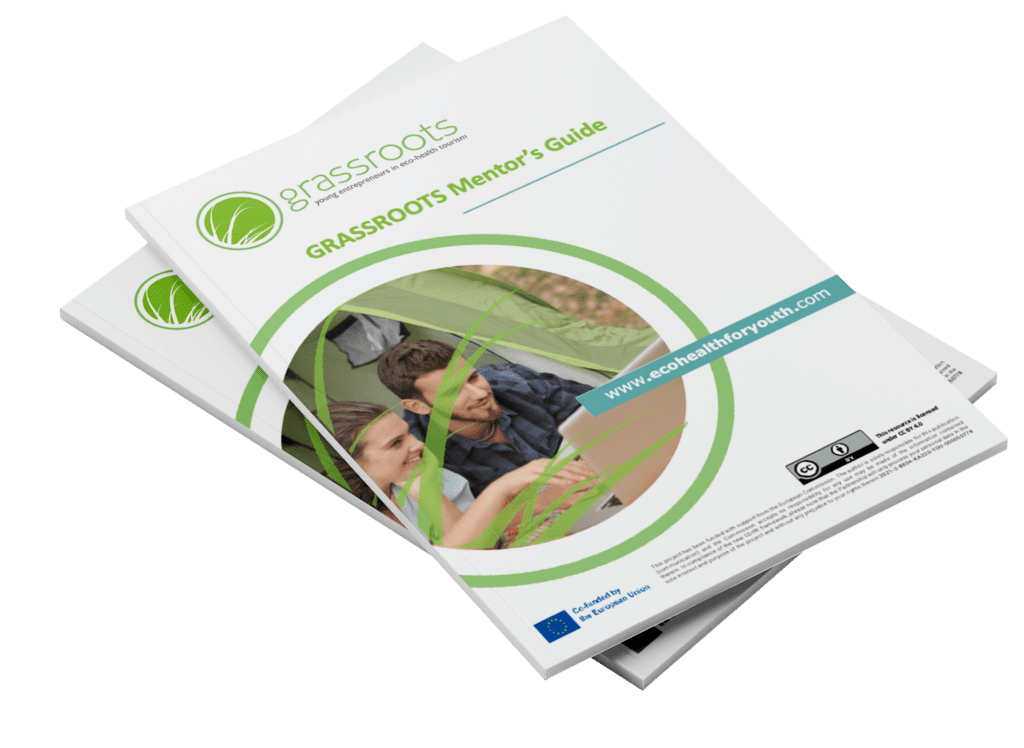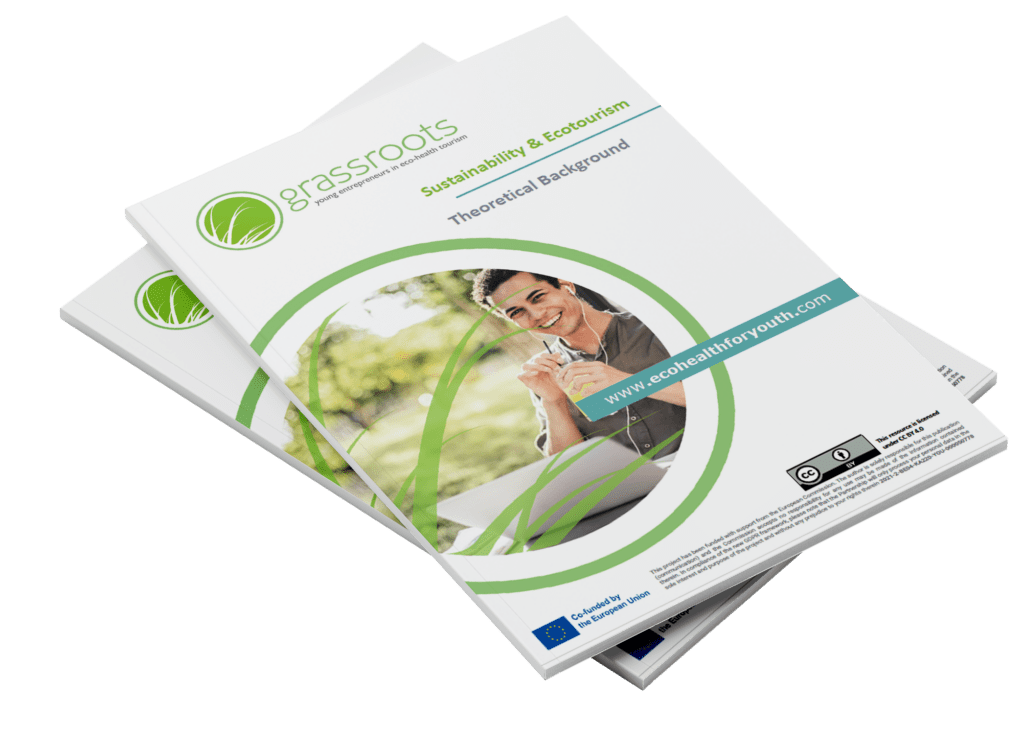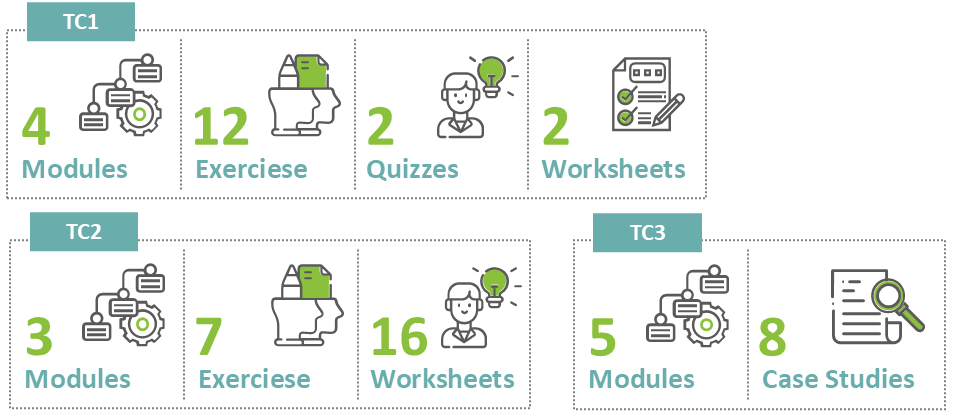The Grassroots Training Program is a comprehensive educational initiative designed to empower young people, educators and professionals with the skills necessary to thrive in eco-health initiatives inclusive of tourism, culture and heritage, street art, food and adventure sports. It consists of 3 key resources tailored to provide you with all you need as you embark on your GRASSROOTS journey.
Targets educators, youth workers, and aspiring eco-health tourism entrepreneurs. The framework aims to inform and develop both technical and entrepreneurial competencies while promoting social inclusion and environmental sustainability.

Designed to assist educators in effectively utilising the training resources, facilitate group learning, and adapt the curriculum to different contexts.

Comprising of 12 Bite-Sized Modules enriched with exercises, quizzes, and worksheets. These interactive elements aim to enhance understanding and encourage practical application. Additional support materials include case studies, theoretical background information, and best-practice examples to further deepen your understanding and inspire real-world application.

Versatile for different educational youth settings: The Grassroots Training Program is versatile and can be used as a standalone curriculum or adapted to suit various educational and professional settings.
Flexible resources to suit short- and long-term training programs: The resources are designed to be flexible and adaptable for short-term workshops, educational settings or extended training programs.
Adaptable to learners needs: Educators are free to download and adapt the resources to their individual learner(s) needs but must keep the copyright and branding of the resources intact.
Section 1:
Competency Framework for Eco-health InitiativesThe Competence Framework is designed to equip educators and young people with the knowledge, skills, and attitudes necessary for thriving in the dynamic field of sustainable eco health initiatives that can be integrated into; adventure sports, culture and heritage, street art, food and events etc. It serves as a guide for mentors, youth workers, and young people to collaboratively build capabilities that align with global sustainability goals and local cultural values.
The purpose of the guide is to navigate educators and mentors through the Grassroots Training Program and its associated materials while providing strategies for designing and adapting entrepreneurial training programs to various contexts. The Mentors Guide starts by exploring different leadership styles and the role of mentorship. It provides insights into effective facilitation methods and offers strategies for adapting to, reaching and engaging diverse groups. Experiential learning techniques are highlighted to maximize the impact of the training, and practical solutions are offered to address common challenges faced by mentors.
The GRASSROOTS Competence Framework is aligned with the EntreComp entrepreneurial competence framework and is designed for flexible use by educators and mentors. At the same time, it offers a structured approach to developing the environmental, social, and entrepreneurial competencies essential for success in eco-health initiatives.
Adapt mentoring programs:Flexible and designed to be used and adapted for both short- and long-term mentoring programs focused on eco-health entrepreneurial skills.
Use the mentoring strategies provided to adapt and facilitate training to diverse youth and groups.
Implement the tools for experiential learning and problem solving to empower young people through education and entrepreneurship.
Section 2:
Mentor's Guide to the Eco-health CoursesThe Mentor’s Guide is designed to support potential youth leaders, mentors, and educators guiding young entrepreneurs in eco-health initiatives. It supports the design and facilitation of eco-health entrepreneurship training and promotes leadership and empowerment strategies.
To enable educators to understand the key competencies in eco-health initiatives such as tourism, food, culture and heritage. Be a catalyst to support youth with fewer opportunities through eco-health initiatives, projects or programs. Equips young people with the required knowledge to develop their entrepreneurial, and social skills.
Duration: Flexible and designed to be used and adapted with the courses, bite sized modules and the resources provided to suit different training programs.
Identify Competencies: Assessing the skills and knowledge of young people in eco-health tourism.
Prepare for Skills Development: Competency blocks focused on technical and environmental know-how, guiding, group facilitation, and business creation.
Support Social Inclusion: Tools and methods to support young people with fewer opportunities
Section 3:
3 Eco-health Training CoursesThe Grassroots Eco-health Tourism Training Courses offer practical and interactive learning experiences designed to develop entrepreneurial competencies and skills in eco-health initiatives in fields such as tourism, adventure sports, street art, food, culture and heritage These courses are divided into bite-sized modules that integrate exercises, case studies, and real-world examples, enabling an interactive and practical learning approach.

The purpose of the Training Program is to assist in developing the skills and competencies of young aspiring entrepreneurs in the field of eco-health. The three courses in this section pay particular attention to equipping young entrepreneurs and participants in the fields of eco-health tourism, environmental knowledge and career development. It encourages peer learning, provides real world case studies and assessment tools so that young people can adapt their initiative and projects to be socially inclusive and environmentally sustainable. In the end learners will be able to apply knowledge gained to create sustainable eco-health tourism experiences and initiatives.

Training Course 1 (TC1) Sustainability & Ecotourism
This introductory course familiarises learners with the training program and the core concepts of eco-health initiatives, with a particular focus on eco-tourism and sustainability principles. It encourages personal reflection and exploration, aiming to empower individuals to confidently and enthusiastically pursue their own unique path within the eco-tourism sector.
Training Course 2 (TC2) My Career in Ecotourism
This course guides young learners to discover their unique potential and shaping a personal and professional path in the eco-health tourism sector. Using the Ikigai framework, participants will identify their vocation by aligning their passions, skills, and values with real-world opportunities and the needs of the environment and communities.
Training Course 3 (TC3) My Ecotourism Project
This course encourages a shift in perspective—embracing a holistic approach that recognizes the interconnectedness of ecosystems, cultural heritage, and local communities. Participants will explore key concepts such as permaculture, territorial diagnosis, sustainable business models, and customer experience design.
Click “+” to access..
This introductory course familiarises learners with the training program and the core concepts of eco-health initiatives, with a particular focus on eco-tourism and sustainability principles. It encourages personal reflection and exploration, aiming to empower individuals to confidently and enthusiastically pursue their own unique path within the eco-tourism sector.
Start Your Learning Journey by downloading Course 1, which includes 4 bite-sized Modules covering core eco-health and eco-tourism concepts and principles.
For deeper reflection, discussions, and role plays in understanding sustainability, climate change, travel, and tourism, there are 12 Exercises included.
Course 1 includes 2 quizzes so you can quickly test your knowledge on all 4 Modules. They are in the format of multiple-choice Quizzes.
For more practical learning tools to help apply your knowledge and understanding of Tourism Industry Impacts and Responsible Tourism Mapping, there are 2 Worksheets
Click “+” to access..
This course guides young learners to discover their unique potential and shape a personal and professional path in the eco-health tourism sector. Using the Ikigai framework, participants will identify their vocation by aligning their passions, skills, and values with real-world opportunities and the needs of the environment and communities.
Start Your Learning Journey by downloading Course 1, which includes 4 bite-sized Modules covering core eco-health and eco-tourism concepts and principles.
For more practical learning tools, there are 16 Worksheets to help map your Ikigai, explore tourism competencies and develop a personal career and development plan.
For deeper reflection, discussions, and role plays in understanding sustainability, eco-tourism, eco-health, climate change, travel, and how tourism has evolved, complete the 7 Exercises.
Click “+” to access..
This course encourages a shift in perspective—embracing a holistic approach that recognizes the interconnectedness of ecosystems, cultural heritage, and local communities. Participants will explore key concepts such as permaculture, territorial diagnosis, sustainable business models, and customer experience design.
Get ready to learn how to develop your own eco-health tourism project by downloading Course 3, which includes 5 bite-sized modules. Learn key concepts such as permaculture, territorial diagnosis, sustainable business models, and more.
For more practical learning tools to help apply your knowledge and understand your purpose, the customer journey and different business models, use the 7 Worksheets
For deeper reflection, discussions, and role plays to understand the 5 modules better, there are 6 Exercises. Use the workshop to dig deeper into eco-health and engage in mind mapping. Explore existing entrepreneurs’ journeys through case studies.
Explore real-world examples illustrating successful ecotourism initiatives and business models by exploring our 8 case studies. Gain valuable learnings and key insights into different business models.